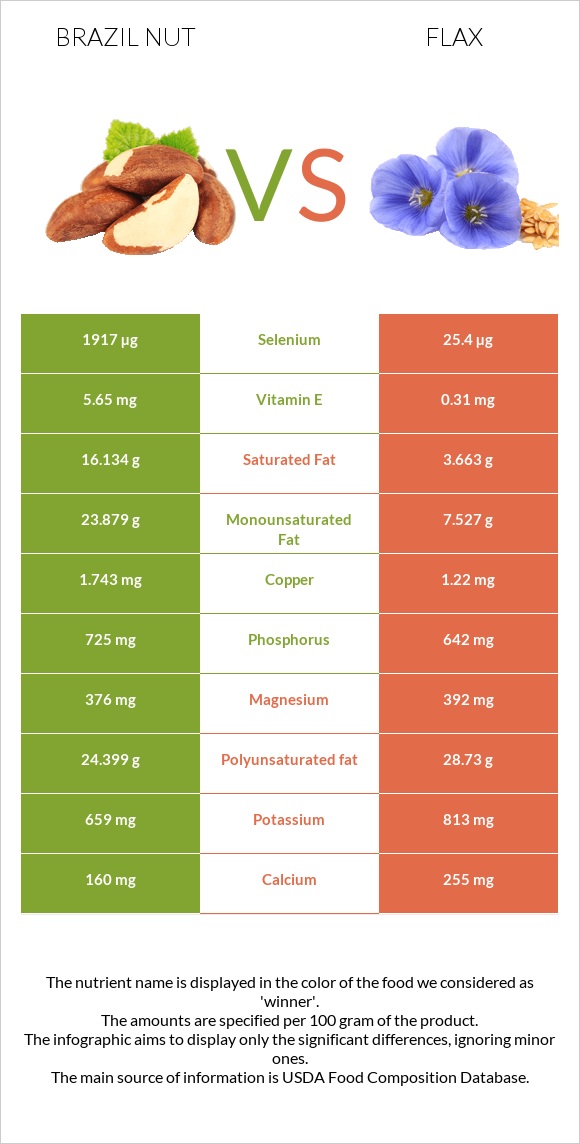Brazil nut vs. Flax seeds — In-Depth Nutrition Comparison
Compare
How are brazil nut and flax seeds different?
- Brazil nut is richer in selenium, copper, and vitamin E, while flax seeds are higher in vitamin B1, fiber, manganese, iron, vitamin B6, and vitamin B3.
- Brazil nut covers your daily need for selenium, 3439% more than flax seeds.
- Brazil nut contains 18 times more vitamin E than flax seeds. Brazil nut contains 5.65mg of vitamin E, while flax seeds contain 0.31mg.
- Flax seeds are lower in saturated fat.
Nuts, brazilnuts, dried, unblanched and Seeds, flaxseed types were used in this article.
Infographic

Infographic link
Mineral Comparison
Mineral comparison score is based on the number of minerals by which one or the other food is richer. The "coverage" charts below show how much of the daily needs can be covered by 300 grams of the food.
| Contains more CopperCopper | +42.9% |
| Contains more PhosphorusPhosphorus | +12.9% |
| Contains less SodiumSodium | -90% |
| Contains more SeleniumSelenium | +7447.2% |
| Contains more CalciumCalcium | +59.4% |
| Contains more PotassiumPotassium | +23.4% |
| Contains more IronIron | +135.8% |
| Contains more ManganeseManganese | +102.9% |
Vitamin Comparison
Vitamin comparison score is based on the number of vitamins by which one or the other food is richer. The "coverage" charts below show how much of the daily needs can be covered by 300 grams of the food.
| Contains more Vitamin CVitamin C | +16.7% |
| Contains more Vitamin EVitamin E | +1722.6% |
| Contains more Vitamin B1Vitamin B1 | +166.5% |
| Contains more Vitamin B2Vitamin B2 | +360% |
| Contains more Vitamin B3Vitamin B3 | +944.1% |
| Contains more Vitamin B5Vitamin B5 | +435.3% |
| Contains more Vitamin B6Vitamin B6 | +368.3% |
| Contains more Vitamin KVitamin K | +∞% |
| Contains more FolateFolate | +295.5% |
All nutrients comparison - raw data values
| Nutrient |  |
 |
DV% diff. |
| Selenium | 1917µg | 25.4µg | 3439% |
| Vitamin B1 | 0.617mg | 1.644mg | 86% |
| Fiber | 7.5g | 27.3g | 79% |
| Copper | 1.743mg | 1.22mg | 58% |
| Saturated fat | 16.134g | 3.663g | 57% |
| Manganese | 1.223mg | 2.482mg | 55% |
| Iron | 2.43mg | 5.73mg | 41% |
| Monounsaturated fat | 23.879g | 7.527g | 41% |
| Fats | 67.1g | 42.16g | 38% |
| Vitamin E | 5.65mg | 0.31mg | 36% |
| Vitamin B6 | 0.101mg | 0.473mg | 29% |
| Polyunsaturated fat | 24.399g | 28.73g | 29% |
| Vitamin B3 | 0.295mg | 3.08mg | 17% |
| Vitamin B5 | 0.184mg | 0.985mg | 16% |
| Folate | 22µg | 87µg | 16% |
| Phosphorus | 725mg | 642mg | 12% |
| Calcium | 160mg | 255mg | 10% |
| Vitamin B2 | 0.035mg | 0.161mg | 10% |
| Choline | 28.8mg | 78.7mg | 9% |
| Protein | 14.32g | 18.29g | 8% |
| Calories | 659kcal | 534kcal | 6% |
| Carbs | 11.74g | 28.88g | 6% |
| Potassium | 659mg | 813mg | 5% |
| Magnesium | 376mg | 392mg | 4% |
| Vitamin K | 0µg | 4.3µg | 4% |
| Zinc | 4.06mg | 4.34mg | 3% |
| Sodium | 3mg | 30mg | 1% |
| Vitamin C | 0.7mg | 0.6mg | 0% |
| Net carbs | 4.24g | 1.58g | N/A |
| Sugar | 2.33g | 1.55g | N/A |
| Starch | 0.25g | 0% | |
| Tryptophan | 0.135mg | 0.297mg | 0% |
| Threonine | 0.365mg | 0.766mg | 0% |
| Isoleucine | 0.518mg | 0.896mg | 0% |
| Leucine | 1.19mg | 1.235mg | 0% |
| Lysine | 0.49mg | 0.862mg | 0% |
| Methionine | 1.124mg | 0.37mg | 0% |
| Phenylalanine | 0.639mg | 0.957mg | 0% |
| Valine | 0.76mg | 1.072mg | 0% |
| Histidine | 0.409mg | 0.472mg | 0% |
| Omega-3 - ALA | 0.018g | N/A | |
| Omega-6 - Gamma-linoleic acid | 0.018g | N/A | |
| Omega-6 - Eicosadienoic acid | 0g | 0.007g | N/A |
| Omega-6 - Linoleic acid | 23.859g | N/A |
Macronutrient Comparison
Macronutrient breakdown side-by-side comparison
Protein:
14.32 g
Fats:
67.1 g
Carbs:
11.74 g
Water:
3.42 g
Other:
3.42 g
Protein:
18.29 g
Fats:
42.16 g
Carbs:
28.88 g
Water:
6.96 g
Other:
3.71 g
| Contains more FatsFats | +59.2% |
| Contains more ProteinProtein | +27.7% |
| Contains more CarbsCarbs | +146% |
| Contains more WaterWater | +103.5% |
~equal in
Other
~3.71g
Fat Type Comparison
Fat type breakdown side-by-side comparison
Saturated fat:
Sat. Fat
16.134 g
Monounsaturated fat:
Mono. Fat
23.879 g
Polyunsaturated fat:
Poly. Fat
24.399 g
Saturated fat:
Sat. Fat
3.663 g
Monounsaturated fat:
Mono. Fat
7.527 g
Polyunsaturated fat:
Poly. Fat
28.73 g
| Contains more Mono. FatMonounsaturated fat | +217.2% |
| Contains less Sat. FatSaturated fat | -77.3% |
| Contains more Poly. FatPolyunsaturated fat | +17.8% |
Carbohydrate type comparison
Carbohydrate type breakdown side-by-side comparison
Starch:
0.25 g
Sucrose:
2.33 g
Glucose:
0 g
Fructose:
0 g
Lactose:
0 g
Maltose:
0 g
Galactose:
0 g
Starch:
0 g
Sucrose:
1.15 g
Glucose:
0.4 g
Fructose:
0 g
Lactose:
0 g
Maltose:
0 g
Galactose:
0 g
| Contains more StarchStarch | +∞% |
| Contains more SucroseSucrose | +102.6% |
| Contains more GlucoseGlucose | +∞% |
~equal in
Fructose
~0g
~equal in
Lactose
~0g
~equal in
Maltose
~0g
~equal in
Galactose
~0g





